AULA 16/2023 – REVISÃO - 05/10/2023
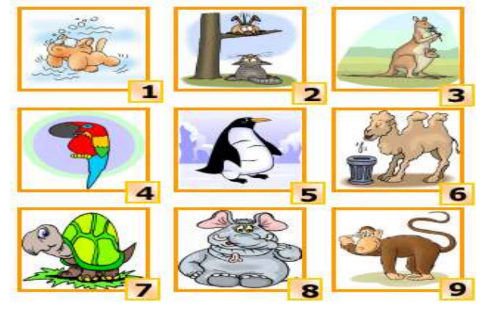
a) Cats /swim.
b) Dogs /climb /trees.
c) Kangaroos / jump.
d) Parrots / speak.
e) Penguins / fly.
f) Camels / walk/ for one month/ with no water.
h) Elephants / live /until they’re seventy.
g) Tortoises / run fast.
i) Monkeys / grab / things.
- Read the text and answer the question below: (Leia o texto e responda a questão abaixo:)
Hi! My name is Julia. I’m eight years old. When I was five years old, I couldn’t read a book. Now I can read, I can write and I can a draw picture. I have a sister. Her name is Claudia. She is 2 years old. She can walk now. But she can’t write, she can’t read and she can’t draw a picture. When I was six years old, I learned to swim. Now I can swim. But Claudia can’t swim. She is a little girl.
Disponível em: https://www.eslprintables.com/ Acesso em 18 de set. de 2021.
Tradução
Olá! o meu nome é Julia. Tenho oito anos de idade. Quando eu tinha cinco anos, não conseguia ler um livro. Agora sei ler, sei escrever e sei fazer um desenho. Tenho uma irmã. O seu nome é Claudia. Ela tem 2 anos de idade. Ela já pode andar. Mas ela não sabe escrever, não sabe ler e não sabe fazer um desenho. Quando tinha seis anos de idade, aprendi a nadar. Agora sei nadar. Mas a Cláudia não sabe nadar. Ela é uma menina pequena. Fill in the blanks with can / can’t / could / couldn’t.
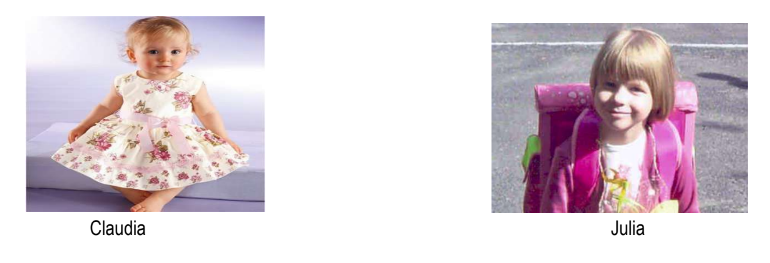

Choose the correct form of modal verb CAN x COULD: (Escolha a forma correta do verbo modal CAN x COULD:)
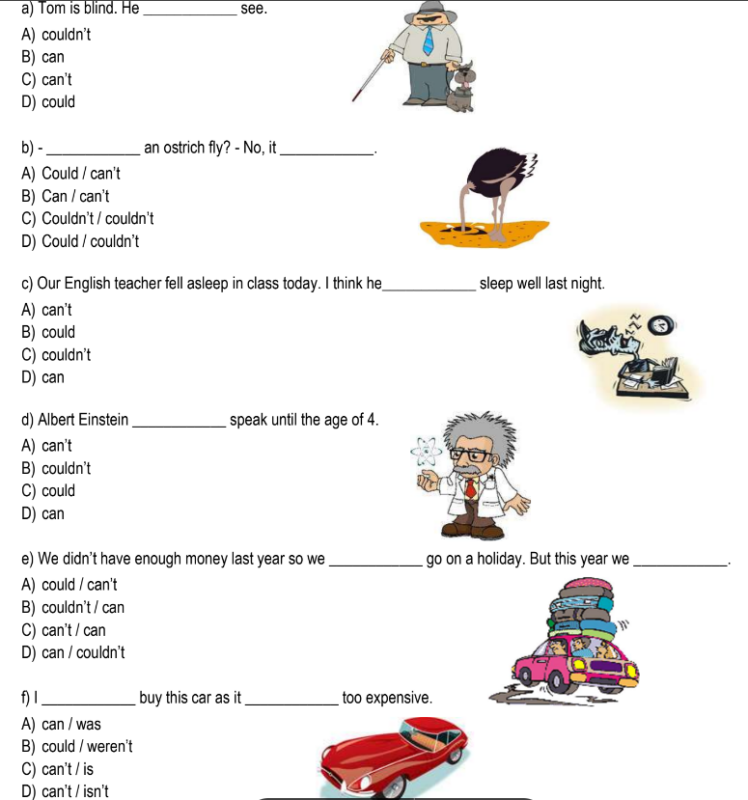

4. Pay attention to the comic strip and answer:
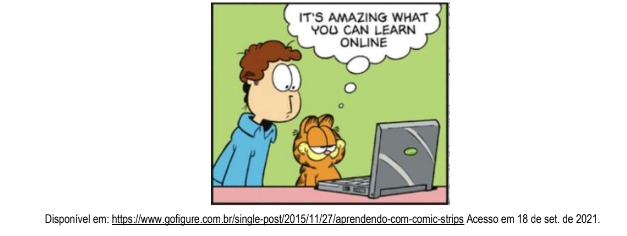
Qual habilidade/possibilidade (CAN) Garfield descobriu ser possível ao olhar para o computador?
- Read the comic strip below and answer the questions about it: (Leia a tirinha abaixo e responda às perguntas:)

a) No primeiro balão, Charlie Brown diz: “E ele bufou e bufou e derrubou a casa!”. Você conhece esse trecho? Qual a
história que Charlie Brown está lendo?
b) No segundo quadrinho, Charlie Brown duvida da capacidade de um sopro derrubar uma casa. Retire do quadrinho a
frase que contém essa possibilidade:
c) Relacionando as falas e as imagens, o que tornou a história engraçada?
Choose the best modal for each sentence. Can, Could, Be able to, May, Might. (Escolha o melhor modal para cada frase.)
- Sara _ Italian food and she _ French food too.
A) can cook / is able to cook B) can cooking / can cooking C) can ́t cooks / can ́t cooks D) can cooks / can cooks
- The little girl asked, “Mommy, _ I have a cookie?” The mother said, “Yes, you _.”
A) may / might
B) can / can
C) can / can ́t
D) can / are able to
- George is absent from class today. He __ be sick.
A) can
B) can ́t
C) could
D) is able to
- __ you play the piano when you were a child?
A) could
B) may
C) can
D) able
- Kevin was disappointed because he __ get tickets for the football game.
A) weren’t able to
B) wasn’t able to
C) could able to
D) can ́t able to
- Write in the blanks the appropriate modal verb for each sentence can, has to, may, may, must, need, should or (not) allowed. (Escreva nos espaços em branco o verbo modal apropriado para cada frase can, has to, may, may, must, need, should ou (not) allowed.)
a) George has travelled a lot. He ____ speak many languages.
b) I can hear you quite well. You ____ not shout.
c) I’m not sure where I will go for my holidays, but I _______ go to Italy.
Which of the three sentences containing a modal verb has the same meaning as the original? (Qual das frases contendo um verbo modal têm o mesmo significado que o original?) - They are able to speak English well. (Eles são capazes de falar inglês bem.)
A) They can speak English well.
B) They may speak English well.
C) They must speak English well.
D) They must speak English well.
- Do I have to clean the kitchen? (Tenho que limpar a cozinha?)
A) Can I clean the kitchen?
B) Must I clean the kitchen?
C) Should I clean the kitchen?
D) cannot I clean the kitchen?
- We have to stop when the traffic lights are red. (Temos que parar quando os semáforos estão vermelhos.)
A) We can stop when the traffic lights are red.
B) We may stop when the traffic lights are red.
C) We must stop when the traffic lights are red.
D) We must stop when the traffic lights are red.
- Am I allowed to ask a question? (Posso fazer uma pergunta?)
A) May I ask a question?
B) Must I ask a question?
C) Need I ask a question?
D) Should I ask a question?
Leia o texto sobre Serena Williams e responda algumas questões sobre ela.
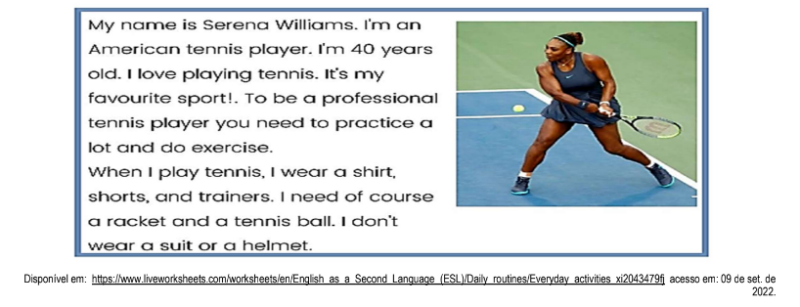
- What sport does she play? (Que esporte ela pratica?)
- What equipment does she need to play tennis? (De que equipamento ela precisa para jogar tênis?)
Read the following text.
Hello, my name is Sue. I am 9 years old. I have a dog. I love to practise sports. On mondays I play soccer with my dog. On tuesdays I play golf with my friends. On wednesdays I go bowling with my parents. On thursday Iplay volleyball with brothers.
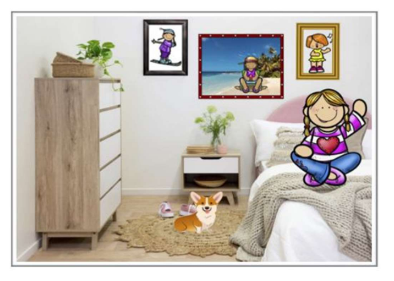
https://sme.goiania.go.gov.br/conexaoescola/ensino_fundamental/lingua-inglesa-
sports/ Acesso em: 09 de set. de 2022.
- Complete a tabela abaixo com as informações do texto sobre os esportes praticado no decorrer da semana pela personagem SUE.

- Write a short text in English talking about your favorite sport and whether you practice it often. (Escreva um pequeno texto em inglês falando sobre seu esporte favorito e se você o pratica com frequência.)
- Number the sports related images in the word order below (Numere as imagens relacionadas a esportes na ordem das palavras abaixo.)